Tue 23 Feb 2010
CALL FOR CAMPION COMPLETE, by Francis M. Nevins.
Posted by Steve under Authors , Characters , Columns[12] Comments
by Francis M. Nevins
This column isn’t my usual hodgepodge but sticks to one subject and therefore deserves a title. How about “Call for Campion Complete”?
A few months ago and for no particular reason I decided to read the first series of Margery Allingham’s short stories about Albert Campion in the order of their original publication as far as that could be determined.
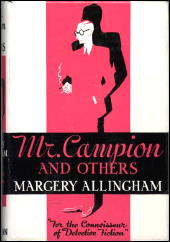
After some research on my own shelves and in The FictionMags Index, which is by far the leading Web source when it comes to identifying where almost any work of short fiction in English first appeared, I identified 18 tales that clearly belonged on my reading list: two dating from 1936 or earlier, fifteen that appeared in The Strand Magazine between late 1936 and 1940, and a singleton first published in a London newspaper shortly before the outbreak of World War II.
There are also two short-shorts that present bibliographic as well as criminous puzzles but let’s save them for a while, shall we?
Revisiting the Easy Eighteen between 70 and 80 years later, I found them by and large to be as clever, charming and delightful as I remembered them from decades ago. Most of the crimes in these stories are jewel thefts or con games, with hardly a murder anywhere but plenty of indications in the later tales that England is moving ever closer to that form of mass murder we call war.
“The Man with the Sack” (The Strand, December 1936) is a light-hearted Christmas story in which Campion frustrates a jewel scam while attending a holiday party at one of those stately homes of England that abound in Golden Age crime fiction.
Two years later, during the last peacetime Christmas season, came “The Case Is Altered” (The Strand, December 1938), where the setting is yet another holiday party at yet another stately home, but this time the McGuffin is a secret document revealing the country’s plans to purchase huge numbers of war planes.
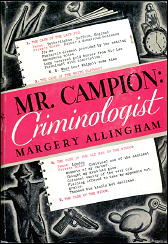
The next Campion tale in The Strand and for my money one of the weakest is “The Meaning of the Act,” an international espionage trifle which came out in the issue of September 1939, the month Hitler invaded Poland.
The eighteenth and last story in the batch is “A Matter of Form” (The Strand, May 1940). This one centers around a magnificent con game which could only have been devised during the so-called phony war, a time of “children in uniform and bankers in mourning” but with minimal disruption of ordinary life, so that Campion can still enjoy an oyster appetizer in the heart of a London soon to be blitzed.
The two stories that predate the fifteen in The Strand and a third from near the end of the cycle need to be treated separately.
“The Border-Line Case” is shorter than any Strand tale and, unlike any other Campion exploit, has a first-person narrator, namely Allingham herself. A careless reading of the story might suggest that she was cohabiting with her character, but then one notices a few subtle hints that besides the narrator and Campion and Detective Inspector Stanislaus Oates, there is a fourth and silent person in the room, presumably P. Youngman Carter, to whom Allingham had been married since 1927.
My guess is that this neat little impossible-crime story dates from between 1933 and 1935, making it Campion’s first short exploit.
“The Pro and the Con” is the same length as the Campion stories in The Strand but doesn’t seem to have appeared there. In this tale we find Campion bound, gagged and beaten up by an Edgar Wallace-style gangster, and that fact alone suggests a date slightly earlier than the Strand fifteen.
“The Dog Day” first appeared in the London Daily Mail sometime in June 1939, probably having been rejected by The Strand because of its complete crimelessness.
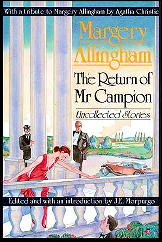
So much for the eighteen Campion tales that definitely belong on my reading list. Now we come to those two pesky short-shorts, each limited to a single scene and just one or two characters if you don’t count Campion and Scotland Yard’s Stanislaus Oates and the corpse.
The earlier of the pair to appear in the U.S. was “The Unseen Door” (Mystery Book Magazine, August 1946), which takes place in the billiards room of a London club. No concrete detail hints that the story might have been published in England ten or more years earlier and therefore belongs in the first series.
My hunch that it does stems from the other short-short, “Mr. Campion’s Lucky Day” (Ellery Queen’s Mystery Magazine, April 1947). Judging from his introduction, founding editor Fred Dannay thought Allingham had just written the tale. In the EQMM version Oates is given the rank of Superintendent, which he first sported in “The Old Man in the Window” (The Strand, October 1936). But when this tale finally appeared in a collection (The Allingham Minibus, 1973), Oates’ title is Detective Chief Inspector!
This strikes me as highly persuasive evidence that the story first appeared in England before October 1936. And is it plausible that two Campion short-shorts with as much in common as this one and “The Unseen Door” could have been written more than ten years apart? My tentative conclusion is that both are early entries in the Campion saga. Perhaps someday we’ll know for sure.
While immersed in my Allingham project I came upon a curious connection between one of these tales and perhaps the most powerful of all English noir novels, Graham Greene’s Brighton Rock (1938).
The sociopaths from the lower depths whose leader is the sexually terrified young racetrack racketeer Pinkie refer to women in several terms like “buers” which I’ve never seen elsewhere. But the Greene character who calls a young woman a “polony” has his counterpart in Allingham’s “The Meaning of the Act,” where a lower-class pickpocket uses the same word, although she (or perhaps her Strand editor) spells it “palone.”
To anyone eager for more about this obscure contribution to English slang: Google the word in either spelling and you will be enlightened.
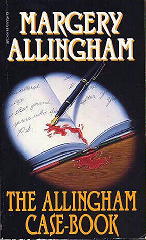
Even reading the fifteen Campion stories from The Strand requires more work than one might think. Besides needing to be at home in FictionMags Index, and assuming you don’t own copies of the magazine from the second half of the 1930s, you must have access to most of the Allingham collections published over the past 70-odd years.
The second edition of Mr. Campion and Others (Penguin, 1950) contains twelve of the fifteen, although chaotically out of order. But the 1936 Christmas story “The Man with the Sack” was collected only in Mr. Campion: Criminologist (1937) and The Allingham Minibus (1973), and its analogue from two Christmases later, “The Case Is Altered,” remained uncollected until The Return of Mr. Campion (1989).
That volume is also the sole hardcover source for the crimeless but charming “The Dog Day.” “The Border-Line Case” and “The Pro and the Con” were collected in both Mr. Campion: Criminologist (1937) and The Allingham Case-Book (1969), with “Border-Line” also appearing in the first edition of Mr. Campion and Others (1939) but not the second (1950).
Those pesky short-shorts “The Unseen Door” and “Mr. Campion’s Lucky Day” remained uncollected until the Minibus started to roll.
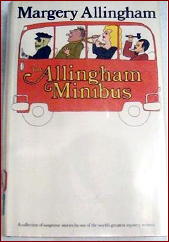
Then there’s one final problem. If you set out to read the Campion stories in order of first publication, as I did, you wind up having to save one of the earliest for last.
How can this be? Because of “The Black Tent,” which Allingham clearly wrote around 1936 but then put aside and rewrote as “The Definite Article” (The Strand, October 1937). The first version remained unpublished until almost a quarter century after her death, when it was included in a British anthology (Ladykillers: Crime Stories by Women, 1987) and then in the most recent Allingham collection to date, The Return of Mr. Campion (1989).
What a mess! Wouldn’t it be loverly if someday all the Campion shorts were brought together in their proper order in a single book?
NOTE: Previously on this blog: A Review by Mike Tooney: MARGERY ALLINGHAM – Mr Campion and Others.
[UPDATE] 02-25-10. I [Steve] posted this last question asked by Mike on the Yahoo Golden Age of Detection group. That it was a good idea, everyone agreed at once. Others wondered if other authors might also be honored with Complete Short Story collections, including (and especially) Edward D. Hoch. Here’s a reply from Doug Greene, head man at Crippen & Landru, which he’s graciously allowed me to reproduce here:
I fear that a complete collection of the Campion shot stories would make a hefty volume, but I’d love to see it done. C&L, however, specializes in books of uncollected short stories — though we made an exception of C. Daly King’s The Complete Curious Mr. Tarrant, which added 4 or 5 previously uncollected stories to the original 1935 volume.
The agent for Lillian de la Torre would like us to collect all of her Dr. Sam: Johnson stories into a single book — including 5 or so uncollected tales, but again the volume would be very long, and pricey to publish.
On the Hoch suggestion, Ed wrote almost 1000 short stories, which would fill about 66 volumes of the usual C&L size. We’ve already published 6 Hoch collections and have plans for at least 3 more… depending on energy and cash flow.
Our latest, Michael Innes’ Appleby Talks About Crime, is now in print, and we’re sending out copies to our subscribers as quickly as possible — especially since I leave for England in about a week (and will stay 10 days). After I return, we’ll take orders from the general public. And to answer an unspoken query, all the stories are previously uncollected.
Doug G
Then this response, also first appearing as a post on the Yahoo GAD group:
Barry Pike, chairman of the Margery Allingham Society, has been trying for a while to persuade Vintage, the UK publishers, to do this, but he doesn’t seem to be getting very far.
Lesley
—
Lesley Simpson
http://www.margeryallingham.org.uk
In spite of some less than entirely optimistic answers, thank you both, gentlemen!
Steve
February 23rd, 2010 at 6:01 pm
A very interesting piece – and a good suggestion!
February 23rd, 2010 at 6:02 pm
I certainly second (or third) the motion!
— Steve
February 23rd, 2010 at 8:34 pm
A Campion Omnibus — it’s long overdue. Also long overdue, the film version of TIGER IN THE SMOKE on DVD (even if Campion is left out of the film).
February 23rd, 2010 at 10:51 pm
Oh, there’s certainly a need for this. Allingham wrote such an interesting variety of stories (there are even a couple M. R. James pastiches), but the collections are a mess. The Border-line Case is quite a little gem, by the way, but is sometimes reprinted without the plan illustration–unforgivable in my book!
February 24th, 2010 at 12:42 pm
This is a fascinating article!
I’ve tried and failed to find out where and when “The Border-Line Case” was first published. It would be really interesting to know. It certainly is a classic mystery.
February 24th, 2010 at 3:28 pm
Which of the collections is the best? The Minibus seems to be the most comprehensive but that is only going on information provided in the article.
February 24th, 2010 at 3:40 pm
The second edition of “Mr. Campion and Others” is likely the best place to start, for readers new to these delightful stories. As Nevins says, it has 12 Campion tales.
And don’t worry about tracking down “the second edition”. This edition is the only one you’ll likely find today. Just buy any paperback copy, and you’ll get the right book with the 12 stories.
February 26th, 2010 at 12:58 pm
I think I have all of the book collections mentioned so someday I may sit down and start reading — no matter what publishing order is recommended.
February 26th, 2010 at 2:12 pm
I’ve been wondering about that myself, how important Mike’s challenge to himself actually is, to read the stories in order, if the goal is, let’s assume, that of gaining the maximum pleasure from them.
But reading Mike’s column made me realize how few of the Campion short stories I’ve read. I’ve read a number of the novels, but in decidedly random order. I don’t think it hurt, but I have a feeling that reading them in order could have been a lot more useful.
The short stories, though, given their nature as detective puzzles and excluding matters relating to Campion and his personal life — or am I wrong about that? — I’m not so sure.
Which doesn’t mean, Mike, that I’m not glad you went ahead and did it!
March 10th, 2010 at 10:12 am
I’ve now managed to find my copy of Barry Pike’s list of Allingham’s short stories. According to this The Borderline Case was published in
Evening Standard on 25 Aug 1936;
Birmingham Evening News, 9 Oct 1936;
Glasgow Evening News, 5 Nov 1936;
Mr Campion Criminologist, Doubleday, 1937;
Yorkshire Evening News, 9 Oct 1937;
Fifty Famous Detectives of Fiction, Odhams, 1938;
Challenge to the Reader, Stokes 1938;
Blackburn Times, 29 Jul 1938;
Mr Campion and Others, Heinemann, 1939;
101 Years’ Entertainment, Little Brown, 1941;
Rex Stout’s Mystery Quarterly, Aug 1945;
MacKill’s, Sept 1953;
The Third Mystery Bedtime Book, Hodder & Stoughton, 1962;
The Allingham Casebook, Chatto & Windus, 1969;
Reveille, 7 Mar 1970;
Modern Short Story Classics of Suspense (Famous Tales of Suspense), Reader’s Digest, 1970,
London After Midnight, Little Brown, 1996.
March 10th, 2010 at 10:20 pm
Thanks very much, Lesley! It’s quite a list, though as a downside, I see that the story’s been reprinted only once in the last 40 years. (Maybe I’m reading more into that than I should.)
— Steve
June 21st, 2010 at 9:12 pm
[…] Call for Campion Complete, by Mike Nevins (the Campion short stories) Tether’s End (reviewed by Tina Karelson) Death of a Ghost (a 1001 Midnights review by Thomas Baird) Mr Campion and Others (reviewed by Mike Tooney) Dancers in Mourning (reviewed by Steve Lewis) […]